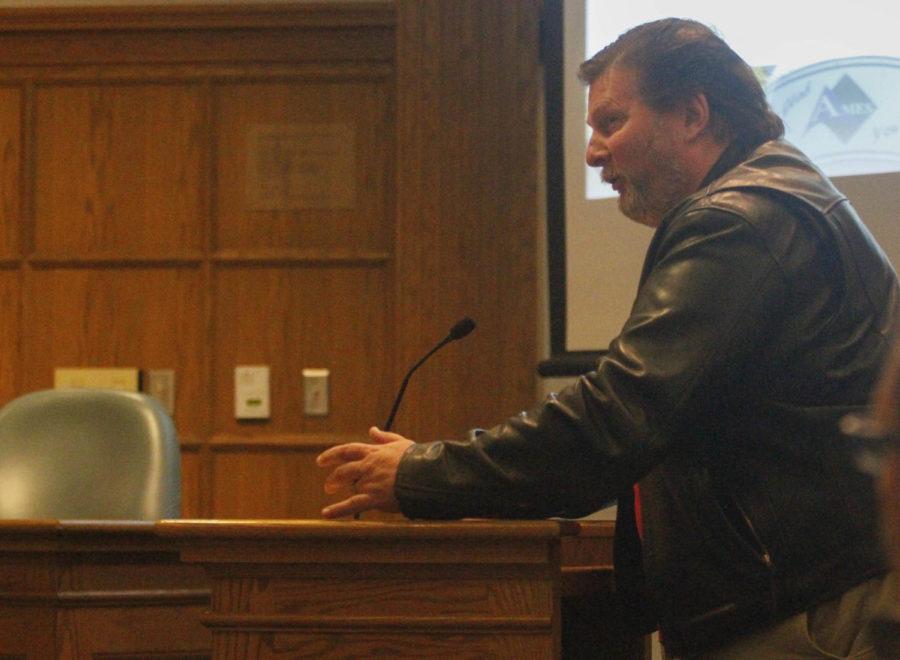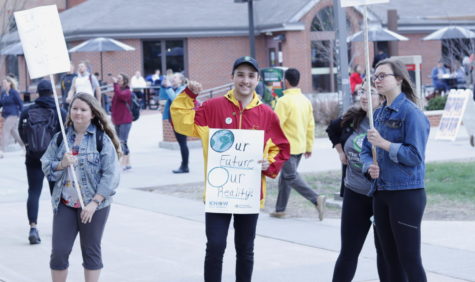Businesses unite to break open blocked sewer lines
Tiffany Herring/Iowa State Daily
Scott Griffen, owner of Corner Pocket and Olde Main Brewery Co., asks a question concerning the Fats, Oils and Grease Program during the City Council meeting April 15.
April 16, 2014
A presentation on fats, oils and grease blockages in the Ames sewer lines was given at a special meeting of the Ames City Council on April 15.
The presentation addressed the concerns surrounding blockages in the sewer lines and discussed methods and programs to improve the city of Ames’ prevention and assessment of blockages caused by fats, oils and greases. This included planned improvements of $300,000 to the grease handling station in fiscal year 2016-2017.
“Grease accumulates in pipes and causes blockages like a heart attack in a person would,” said Kristin Evans, city of Ames environmental engineer.
The grease blockages are considered health code violations when they occur in restaurants and can cause environmental issues if wastewater backs up, said Evans.
The council’s attention was brought to the different kinds of grease interceptors — such as gravity flow interceptors and hydro-mechanical units — and the benefits of both. Programs that are in place to handle fats, oil and grease blockages in other communities were analyzed, including the Des Moines Wastewater Reclamation Authority program as well as the programs in Cary, N.C., Muscatine, Iowa and Duluth, Minn.
The investigation into the method that Ames uses to deal with blockages has been in place since October 2010 when a meeting was held with local restaurants to begin talking about what was happening in the sewer system.
Several other meetings have been held with the Council as well as grease haulers in Ames to discuss the issue. In January 2014, a public forum with about 35 Ames food service establishments was held to discuss the impact the program would have on local restaurants.
“The reaction was fairly positive to what we were proposing,” Phillips said.
The program would require those responsible for blockages to pay a fine as well as assist with the cost of city cleanup, and a restaurant rate would be created for food service establishments.
Food service establishments would be given a chance to receive exemption from the higher restaurant rate if they comply with the program limits every six months.
It was proposed that the program be implemented for one year, during which no rate or penalties would be adjusted and would allow time for customers to acclimate themselves to the program.
“If you are a restaurant manager and are doing all of the right things already, this program should not affect how you do your day-to-day,” Phillips said.
Several owners of businesses that fall under food service establishment permits expressed their opinions on the proposal.
“I think this is really a very nice way to approach things, and I think it will be very effective,” said Ryan Jeffrey, co-owner of Arcadia Cafe, located in Campustown.
Scott Griffen, owner of Olde Main Brewing Co, expressed concerns on how responsibility will be determined for blockages when one water line services an establishment as well as residential dwellings.
Iowa State, which is a part of the Non-Domestic Waste Pretreatment Program, would not be required to meet the proposed exemptions, but would be given a set of limits by the Non-Domestic Waste Pretreatment Program by which to abide.
Following the presentation, an annual review of water and sewer rates was reported on to the Council. The current water and sewer rates have risen due to facility improvements and anticipation of upcoming infrastructure expenses related to the growing Ames community.
The report proposed an 8 percent raise in the sewer rate and no change in the water rate. The increases would affect customer bills beginning on June 1, 2014.

















